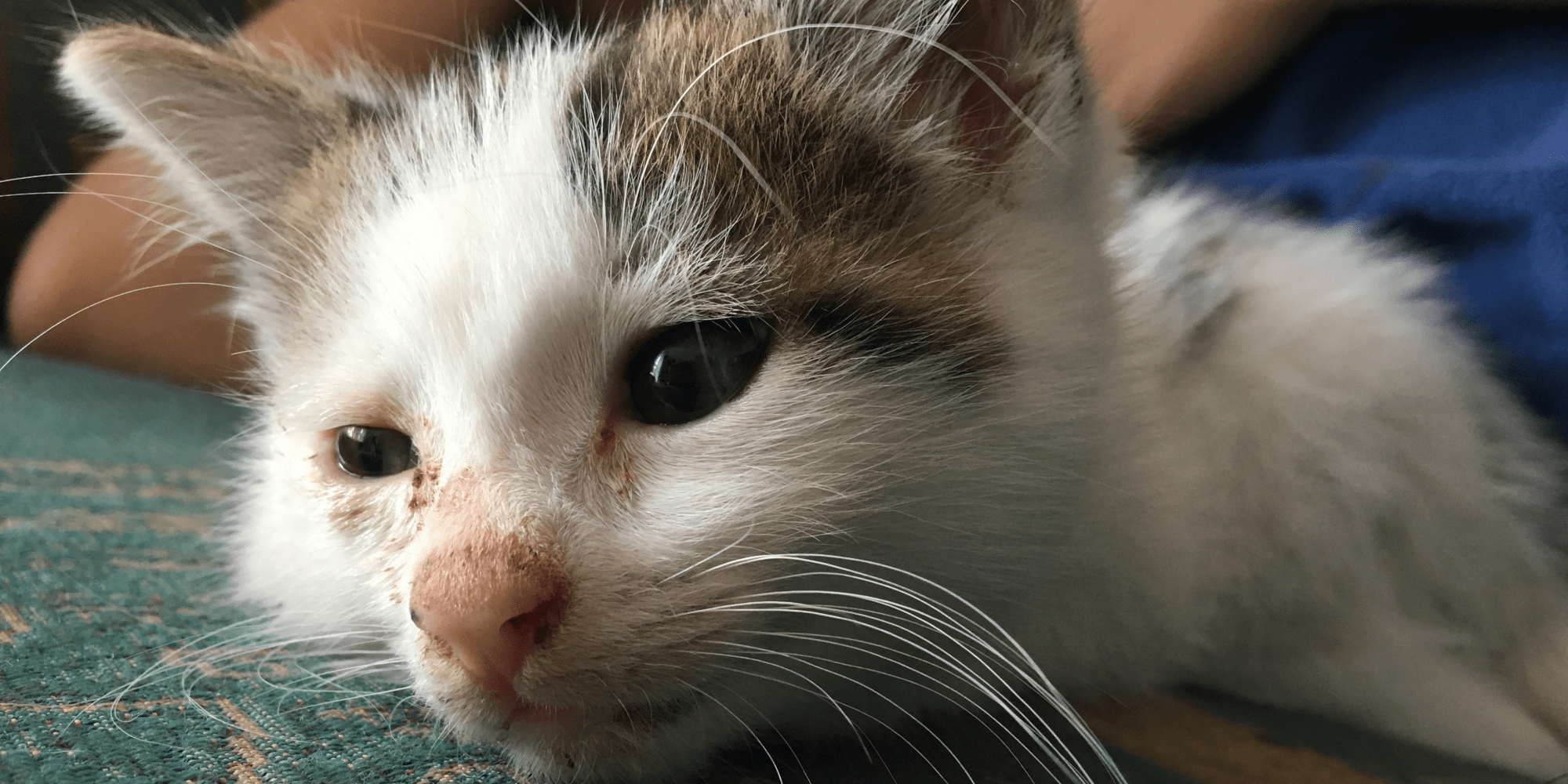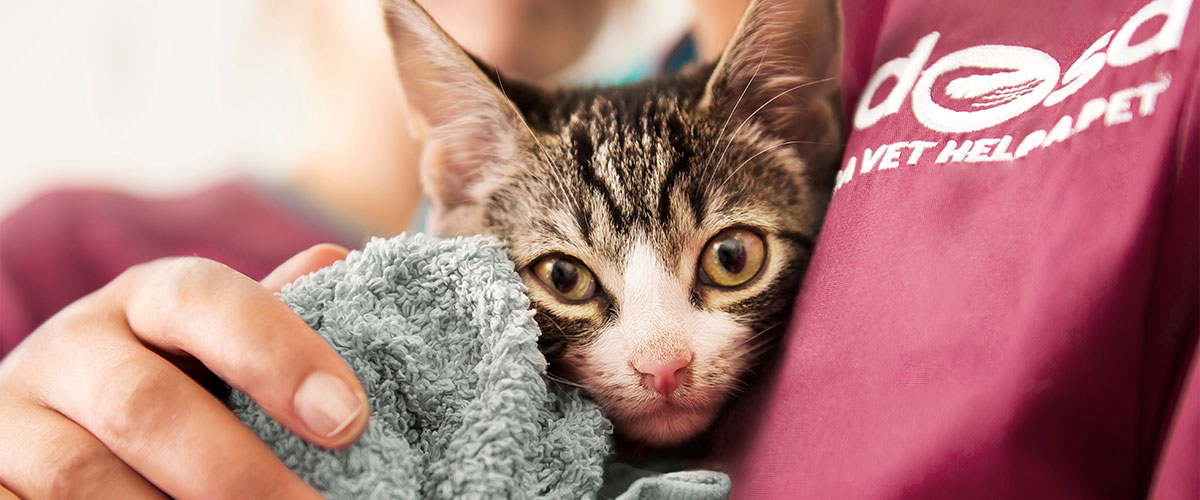Cat flu in kittens
Overview
- Cat flu is an illness that causes symptoms similar to human flu.
- It tends to affect kittens much more severely than adult cats and, left untreated, can even be fatal.
- Vaccinating your kitten for cat flu will drastically decrease the chances of your kitten catching it.
- It’s important to contact your vet for advice if your kitten develops any symptoms of cat flu, even if they are mild.

Feline infectious upper respiratory tract disease, more commonly known as cat flu, is an illness that causes cats to develop symptoms similar to human flu. It can be caused by a virus (Herpes virus or Calicivirus) or bacteria (Chylamydiophila), or sometimes a combination of the three. Cat flu is spread by sneezing, direct contact, and on surfaces such as food bowls and human hands. Although adult cats often recover from cat flu, it can become very serious in kittens and in severe cases cause death.
Unfortunately, some cats can become permanently infected with a cat flu virus and become a ‘carrier’. Cats that are permanently infected with cat flu may have symptoms that come and go, and can spread it to unvaccinated cats. It’s really important to have your cat vaccinated against cat flu and keep up to date with their boosters throughout their life.
Symptoms
The symptoms of cat flu tend to be more severe in kittens than in adult cats because their immune system isn’t as strong. They also depend on what virus and/or bacteria is causing the flu. It can take up to three weeks for the symptoms of cat flu to develop after infection, meaning your kitten could appear fine at first then develop symptoms a while later.
Symptoms of cat flu include:
- Sneezing and coughing
- Weepy eyes
- Painful eyes
- Eye ulcers
- Runny nose
- Mouth ulcers
- Drooling
- Lethargy (low energy)
- Reduced appetite
- Fever (high temperature)
Although rare, kittens with flu are prone to more severe symptoms such as:
- Trouble breathing
- Pneumonia (lung infection)
- Painful joints, limping and stiffness
Diagnosis
Your vet will diagnose cat flu in your kitten based on their symptoms. They might also add a special stain to your kitten’s eyes to check for ulcers.
Finding out which virus or bacteria is causing your cat’s flu isn’t usually necessary as the treatment is the same. However, if your vet thinks it would be useful to find out the cause they may take swabs from your kitten’s nose, eyes, or throat and send them to a lab for testing.
Treatment
There is no specific cure for cat flu, so treatment tends to focus on speeding up recovery. Your vet may suggest some of the following:
Fluid drip — if your kitten is sick, they may be dehydrated and need fluids.
Anti-inflammatory pain relief — to reduce any fever, pain, or inflammation.
Antibiotics — antibiotics don’t kill viruses, but they can help clear up bacterial infections, and prevent more from developing. If your kitten is prescribed antibiotics, always finish the course (even if they seem better halfway through).
Mucolytics — these are drugs that help to break down any sticky mucus in your kitten’s airways and make it easier to cough up. This helps them to breathe more easily and smell their food, which is important to keep them eating.
Eye drops — eye drops are often given to kittens with cat flu as a precaution to prevent infection and ulcers. Lubricating eye drops can be used to keep the eyes moist and antibiotic eye drops can be used to treat infections. If your kitten is given antibiotic eye drops it’s very important to follow the instructions and complete the course to ensure the infection doesn’t come back.
Antiviral medication — antiviral medication such as ‘famciclovir’, can be used to help fight viruses. However, it’s important to be aware that they don’t work in every case, need to be given for three to four weeks, and can be very expensive.
Appetite stimulants — if your kitten isn’t eating your vet might recommend drugs to help improve their appetite.
How to help your kitten at home
If your kitten has cat flu they should be seen by your vet, but there are also things you can do at home to help alongside their treatment and medications:
Keep their eyes and nose clean — use a cotton wool pad soaked in warm (not hot) water to wipe away any discharge from your cat’s eyes and nose once or twice a day. This will help them breathe, feel better and smell their food (which keeps them eating).
Warm and strong smelling food — tempt your cat to eat by warming their food slightly, or by adding a small amount of something strong-smelling such as sardines, anchovies or tuna. Always mix warmed food thoroughly and make sure it’s not too hot.
Help them decongest — a steamy room such as a bathroom after a shower or a bath can help break down some of the thick mucus in your cat’s airways. Make sure to keep them away from the hot water and never force your cat to stay in a steamy room if they seem stressed.
Reduce stress — keep your kitten as stress-free as possible because stress can affect the immune system and is likely to make their flu worse.
Prevent spread—it’s important to keep your kitten away from any unvaccinated cats in your household and to have those cats vaccinated as soon as possible. Wash your hands after handling your kitten before handling other cats.
Outlook
Your kitten’s outlook will depend on how severe their symptoms are, and whether or not they become a carrier. Some kittens recover fully and never have a problem again, but unfortunately, some become permanently infected. This is known as being a ‘carrier’. If your kitten is a cat flu carrier, they are likely to have symptoms that come and go throughout life, especially during times of stress, or when they are otherwise unwell. Some unlucky carrier cats suffer with symptoms all the time, meaning they need long-term medication to control their symptoms and keep them happy.
Vaccination
The best way to prevent cat flu is by vaccination. Most healthy kittens can have their first vaccination at eight weeks old, and then afterwards should receive a yearly booster. If your kitten has already caught cat flu, you should still have them vaccinated to help reduce symptoms in the future, but you will need to wait until they have fully recovered. Don’t allow your kitten to go outside or mix with any unvaccinated cats until they have been fully vaccinated.
When to contact your vet
If your kitten is showing signs of cat flu it’s important to contact your vet as soon as possible. If left untreated they are likely to get worse, and could even develop life-threatening complications.
Important
Tell your veterinary receptionist that your kitten may have cat flu when you phone for an appointment - it’s likely they’ll ask you to wait in the car to protect any unvaccinated cats and kittens in the waiting room.
What causes cat flu?
Cat flu is caused by a few different germs, some of the most common are Herpes virus, Calici virus and Chlamydophila bacteria. These germs are all very infectious and spread quickly between cats.
Can cats catch human flu?
No, human flu is caused by different viruses. Dogs and cats can’t catch human flu and humans can’t catch flu from pets.
Published: March 2023
Did you find this page useful?
Tell us more
Please note, our vets and nurses are unable to respond to questions via this form. If you are concerned about your pet’s health, please contact your vet directly.
Thank you for your feedback
Want to hear more about PDSA and get pet care tips from our vet experts?
Sign up to our e-newsletter
Written by vets and vet nurses. This advice is for UK pets only. Illustrations by Samantha Elmhurst.

